Noticed the ugly purple tint on your car windows? Don’t panic, we have the answers here. Discover why car tint discolors over time and how to prevent or fix it. Whether you’re an owner or installer, this guide delivers practical solutions. Say goodbye to faded film and hello to clarity. Let’s restore your view!
Can Window Tint Film Fade?
Studies show that window film optical and dye integrity deteriorates over time under UV exposure and heat. For example, an aging study of commercial UV-blocking window films found measurable changes in visible light transmission and color balance following prolonged exposure.
One source states: “Low-quality films may display color-fading within months of installation — higher-quality films could last up to 20 years.”

In short, absolutely, the tint film you applied to your vehicle’s windows will fade, but the details are not just one word simple. Car window tinting is a polymeric coating that undergoes a natural degradation process due to hydrolysis, which leads to fading.
The real culprit to worry about regarding discoloration of tinted windows is direct sun exposure and other destructive agents. These factors accelerate the fading process exponentially and bring car window tint films to their downfall sooner than it is expected.
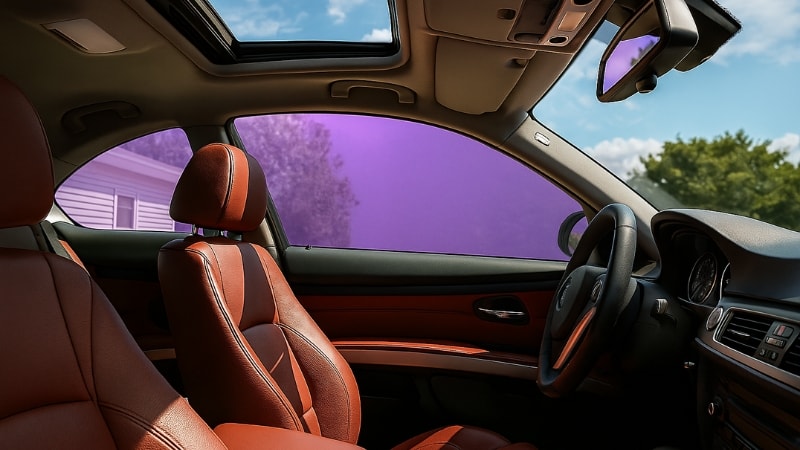
So, yes, car window tinting does fade away, but whether it happens sooner or over a long period of time is subjective to various factors, which we will be diving into in the next section.
Reasons Window Tint Fades: Degradation or Discoloration
Fading can either be due to degradation or discoloration; the terms are often used interchangeably, but are not synonymous. Fading of different tint films due to degradation and discoloration has different causes and even variable effects.
Repeated exposure to the deleterious conditions results in discoloration, while degradation is the internal breakdown of the polymer structure.
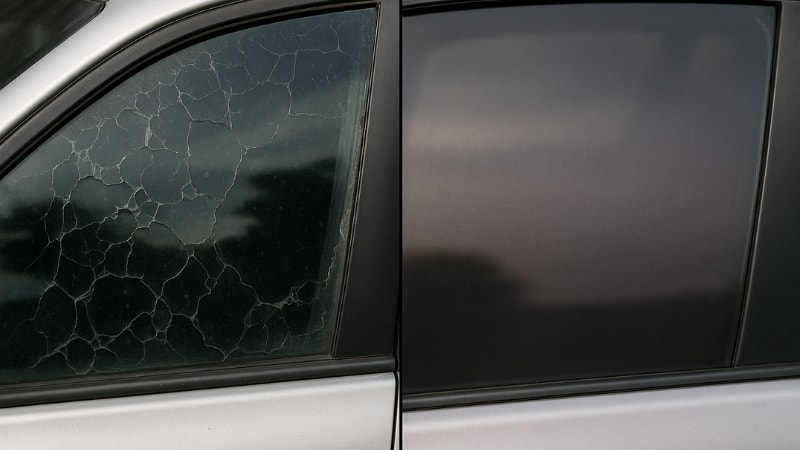
Here are the reasons for window film fading due to degradation and discoloration;
Fading Due to Degradation
Photochemical Reaction: Under the extended UV exposure, the intermolecular forces and chemical bonds that keep the polymer matrix together react with the photons, initiating a photochemical breakdown.
This photochemical degradation at the molecular level eventually leads to the tint fading, especially in dyed tint. Carbon tint films and ceramic tint films are much resistant to these effects, but not entirely resilient.

Hydrolysis: When the moisture present in the environment adsorbs on the surface, it cleaves chemical and intermolecular bonds of the polymer, which causes hydrolysis and leads to a brittle and discolored film. However, it is an extremely slow process for all tint percentages.
Oxidation: Oxygen itself is a continuous threat to polyurethane films as it degrades via oxidation even in darkness. Over time, exposure to oxygen also leads to the loss of integrity at a micro-level.
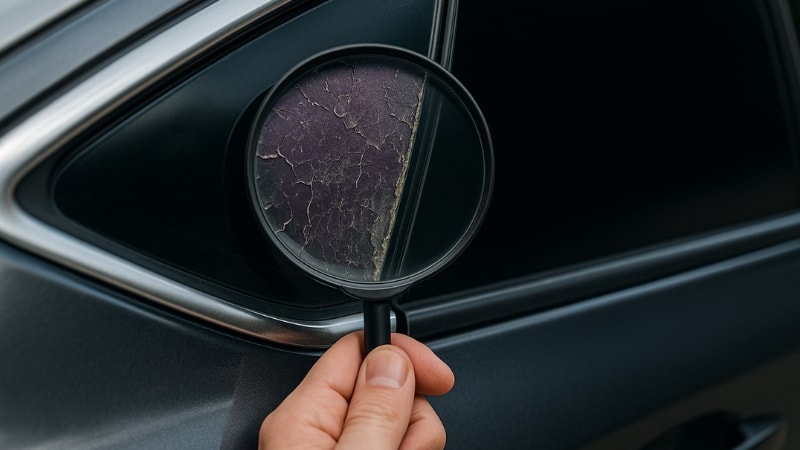
Fading Due to Discoloration
Harsh Chemical Interference: Harsh chemicals and ammonia-based cleaners do wipe out the dust and dirt, but accelerate the fading process by negatively reacting with the dyes’ molecules.
However, the dye of 5% tint film might resist fading and take a long time to discolor as it has a greater amount of dye embedded in its matrix.
Heat Exposure: The main culprit behind tint fading is solar heat, as the film directly bears the torments of harmful UV rays to provide a cooler interior. The heat radiation gradually deteriorates the tint glue, which gradually weakens the film and later leads to fading.

Adhesive Deterioration: With time, the layer of adhesive under the film starts to shrink and weaken due to prolonged exposure to UV rays, humidity, and heat radiation.
When the adhesive undergoes breakage, its ability to block harmful UV rays also diminishes, and hence, the windshield tint life reduces.
Poor Quality Tint: In low-quality tints, the dye molecules absorb wavelengths of energy, due to which, over time, the color shifts and turns purple. Unlike high-quality tints, these films also offer protection from direct sunlight and, therefore, suffer due to UV damage.
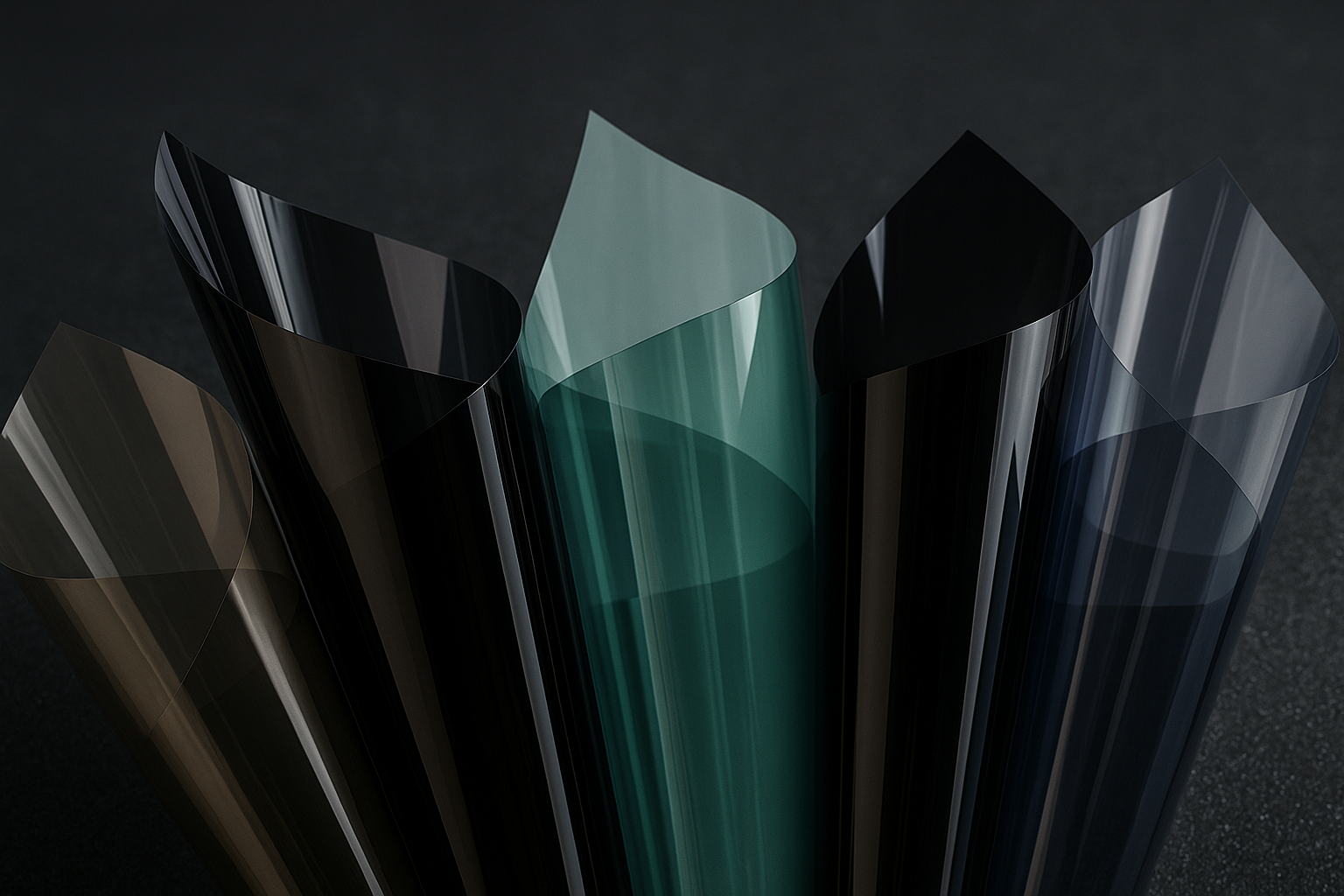
Demerits of Fading of Window Tint Film: Adverse Impacts
Window tint fading only occurs when the film starts to lose its integrity and undergoes the internal breakdown of its structure. In practical terms, fading is not just a superficial issue; it is a sign that the film is deteriorating.
When the tinting agent embedded in the film gradually diminishes, functional qualities of the film decline.
Since the tint is no longer performing its intended role, there will be demerits. So, let’s discuss the key demerits when the window tint fades.
Increased Glare
When the window tint fades, it also starts to develop a glare and reduces the optical clarity for driving safely on the road. Reduction in optical clarity not just puts your safety at risk but equally affects the vision, as eyes can be strained looking through a discolored windshield.
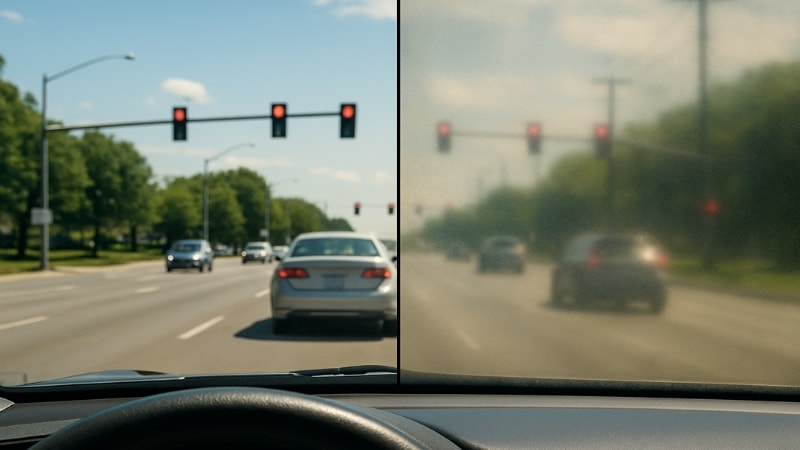
The importance of windshield film is imperative when it comes to safety.
Interior Damage
Window tints only resist UV rays until the UV absorbers embedded in the film remain effective to absorb the harmful UV rays. But fading comes with the cost of a decrease in the effectiveness of these absorbers, which leads to penetration of the UV rays through the windows and discoloration of upholstery.
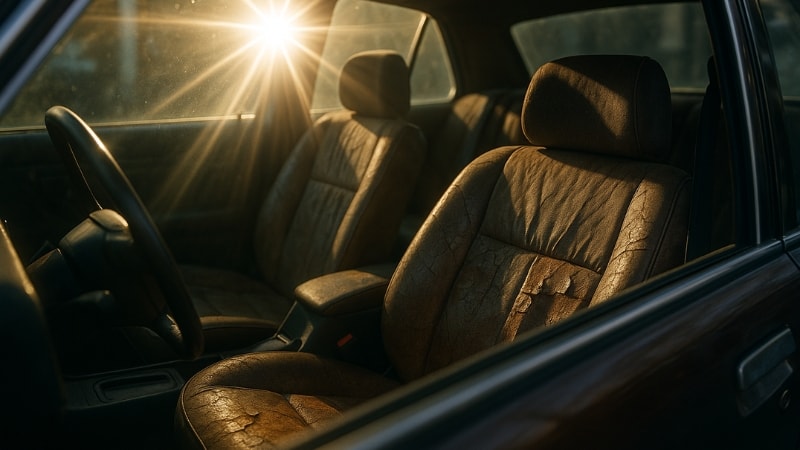
Glass Damage
Functional window UV protection films, apart from absorbing sun rays, passively perform the function of protecting the window surface from damage. When the functionality is lost, your windows get prone to scratches, swirl marks, and rock chips.
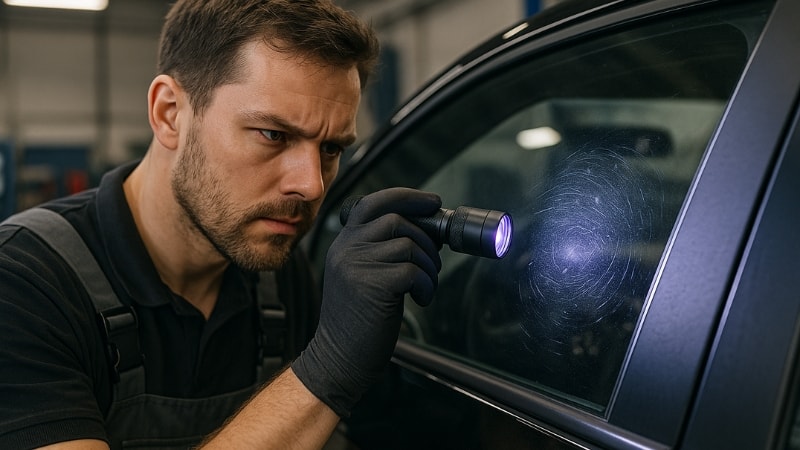
UV Exposure
When the fading of tinted windows occurs, the UV-blocking properties also get compromised. Since the film is no longer blocking UV rays effectively, rays will pass through the window, exposing passengers to the adverse effects of harsh sunlight.

Compromised Safety
A faded window tint puts you at risk of potential accidents, as there can be a distortion to windshield visibility due to hue development. This obstruction of the visuals can cause accidents, especially during critical moments like fast traffic, heavy rainfall, and driving in the dark.
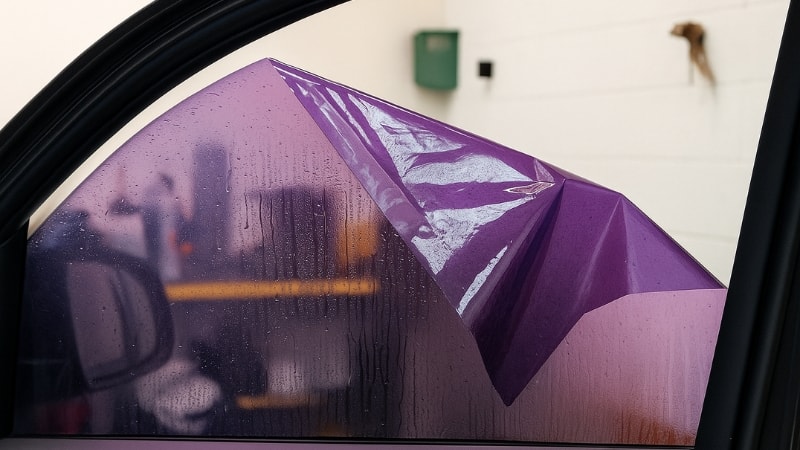
Reduced Nighttime Visibility
While a faded tint may seem manageable under direct sunlight, its deterioration becomes more evident at night due to reduced ambient light. Whether it’s 35% tint, 20% tint, or 70% tint, the uneven window tint film hinders the vision of the road, which in turn jeopardizes the safety of passengers.

Vehicle’s Appearance
Although less dangerous compared to safety concerns, the fading of legal tint also undermines the sleek and modern look of your vehicle. Consequently, both the appearance and safety suffer simultaneously as the film loses its effectiveness.
How to Delay Fading & Extend Life: Maintenance 101
Delaying the fading of tinted windows and extending the life of a window tint are connected; where one goes, the other naturally follows.
When you take measures, mainly regular maintenance-based ones, the environmentally driven fading slows down, and in return, the tint remains effective and its life extends.
Use Ammonia-Free Cleaners
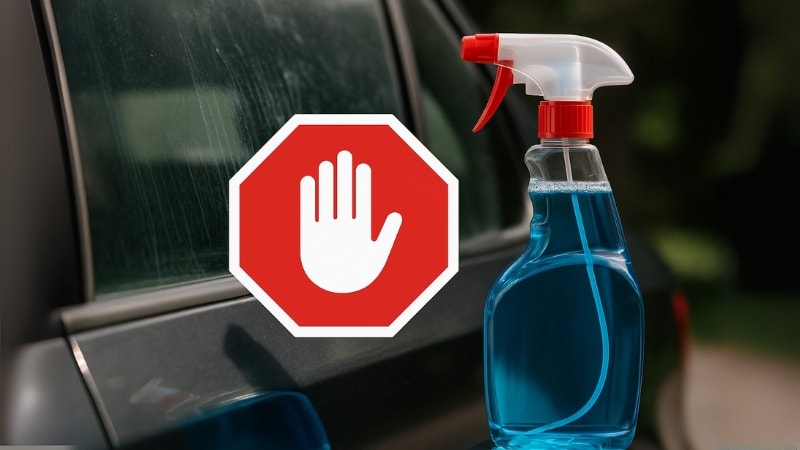
You must have heard that to maintain regular cleaning to keep your car’s exterior protection, be it vinyl wrap, paint protection film, or branded window tint films, in mint condition.
It is true, frequent washing is required, but one thing lesser known is that you must use only ammonia-free mild soap to prevent films from disappearing.
Employ Soft Microfiber Cloth
While cleaning your car’s tinted windows, you must know that improper cleaning techniques can harm even the premium tints. Henceforth, you may regularly clean window film to prevent fading, but must use a soft cloth while scrubbing so that the film does not develop micro-abrasions.
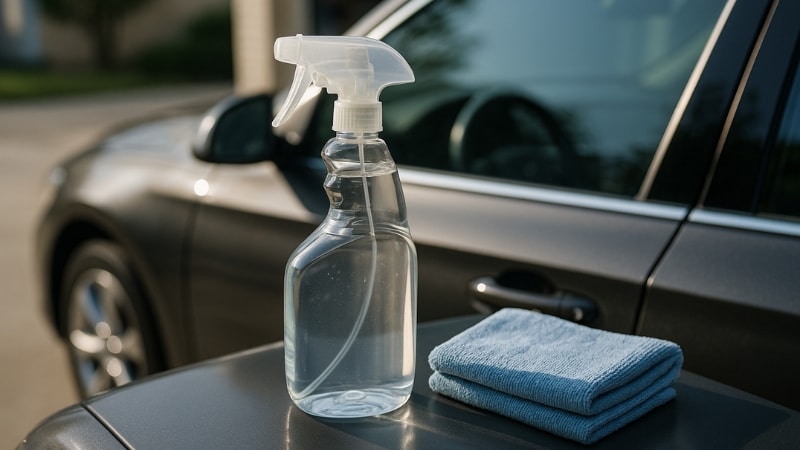
Opt for Professional Installation
Often overlooked, but proper installation also plays some part in the overall lifespan of your window’s sunlight tint. Therefore, you must get professional window tinting services, as only a skilled installer can avoid any poor installation practices and ensure smooth application.
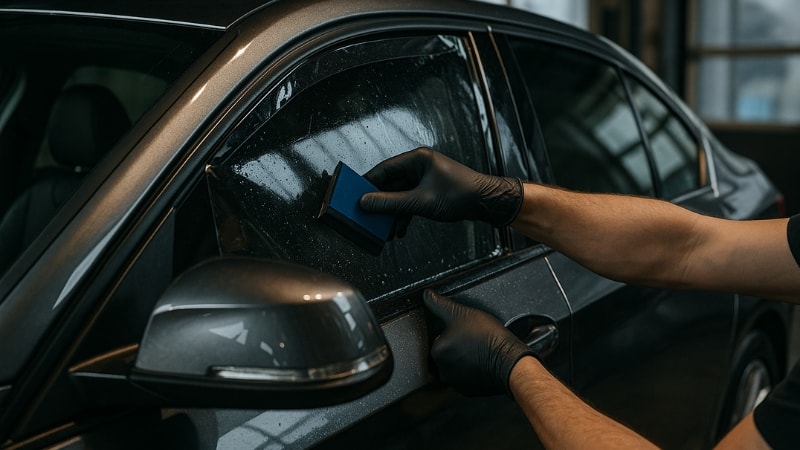
Prefer Shaded Parking
It is no secret that sun exposure is the major culprit for fading, and while it cannot be prevented, neither do we want you to; it can certainly be optimized. By optimizing, we mean that whenever you need to park the car, try to find a shaded area so that the window tint isn’t exposed to UV light for long hours.
Although this practice may not be possible every time, limiting direct sunlight on your sunroof tint only when possible will help prevent fading.
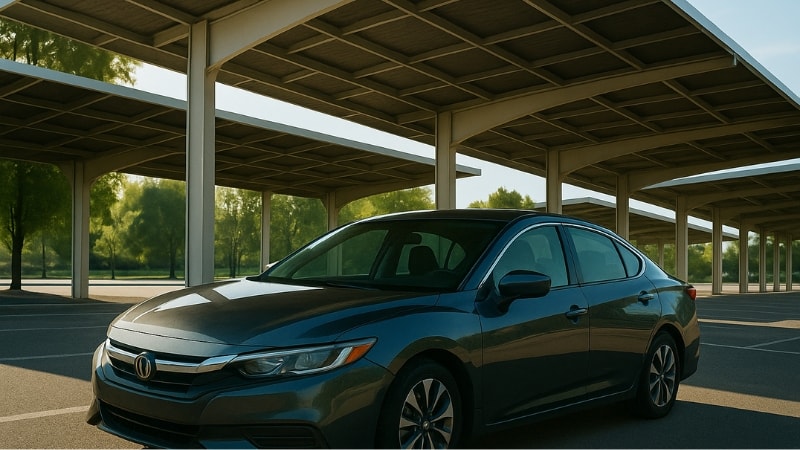
Look Out for Peeling
As a part of your regular maintenance routine, keep an eye out for edges coming off and peeling ends so that they can be catered to at an early stage. If you find your tint film lifting from any end, apply the heat to soften the adhesive, and then restick the edge to seal it, just like PPF and vinyl lifting.
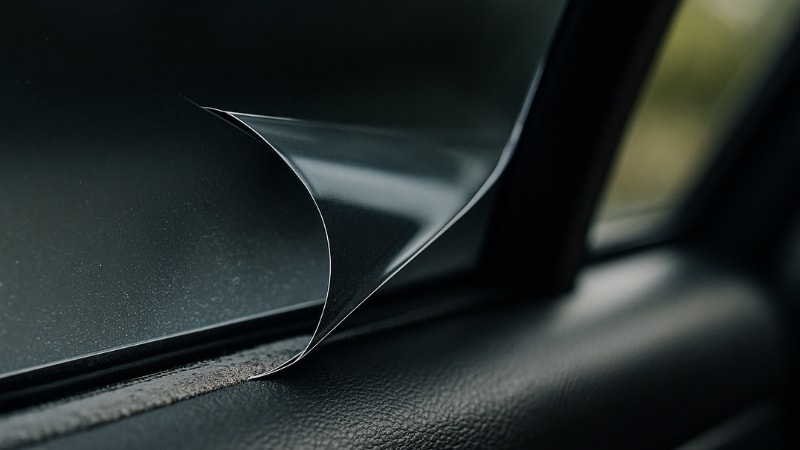
Choose High Quality Window Tinting
The quality of the tint also prevents fading, which extends the shelf life. Thus, opt for high-quality window tinting from trustworthy manufacturers as premium tints are made with high-quality dye and polyurethane polymer.
Solution to Prevent Window Tint Film Fading Due to Sunlight
Sunlight is the major reason for purple discoloration development in window tints, but cannot be completely avoided. So, in this section, we will be exclusively focusing on the solutions regarding accelerated fading due to sunlight.
Sunshades: When parked under the sun, sunshades can block UV rays and thus reduce heat accumulation. So, whenever you park outside, cover your vehicle’s roof with specialized sunshades.

UV Absorber: These are specialized chemical additives that have the capacity to absorb UV rays to prevent them from passing through the film.
So, choose films in which these plastic additives are impregnated into the polymer matrix to add the functionality of UV protection.
Ceramic Tint Film: If you cannot manage the hassle of following all these steps, then you should opt for ceramic window tints as they are exceptionally UV-resistant.

Especially for commercial window tinting, in which elaborate preventive measures cannot be followed for fleets, ceramic film proves to be the right tint for fleet vehicles.
Vehicle Covers: Another solution is to cover the entire surface of your automotive with vehicle covers whenever they are parked outside for long periods. These covers cut off the direct exposure of window tints to sunlight and add an element of UV protection.

Tips to Address Window Tint Film Fading Complaints
Fading of window tint is bound to happen; thus, the customers who are unaware of the science behind it are naturally going to come with complains. As a professional tinting service, you need not worry as these complains can be easily handled through the following strategies;
Educate About the Science Behind
Awareness is the best solution any window tinting service can offer to its customers concerned about fading. Apprise them of the fact that even if you have the world’s best tint, it will eventually fade over the years, except if they keep their car locked in the garage, which is impractical.

The lifespan of window tint can be extended not by entirely blocking UV rays but by following different measures, like regular cleaning, using a soft cloth, and others.
Assess Usage Intensity
Well, since fading is also accelerated by other environmental factors, only pointing fingers at the natural process would be unfair.
So, if a customer uses harsh cleaning chemicals or parks their car under the sun for extended hours, it is partly to blame for the fading. These facts are also true for PPFs and car vinyl wraps.
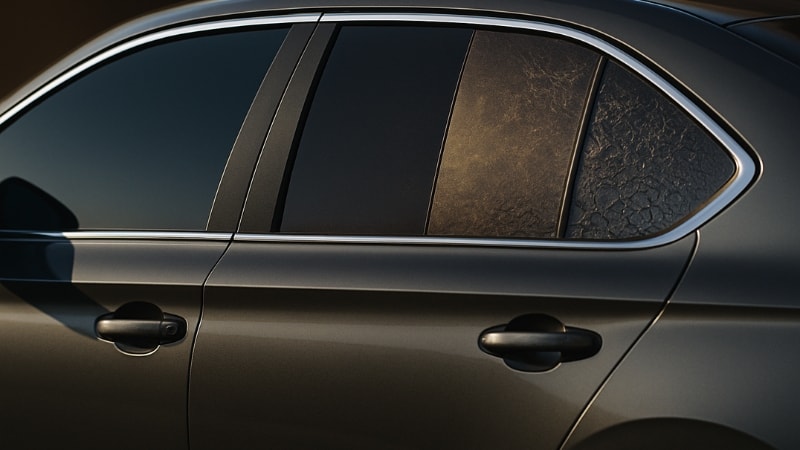
Diagnose the Cause
Car owners also often confuse degradation and discoloration; thus, you must diagnose the cause that is leading to fading. A car window tint film that has started to bubble and become brittle is actually undergoing degradation and will require tint replacement.
At the same time, discoloration happens due to external factors.
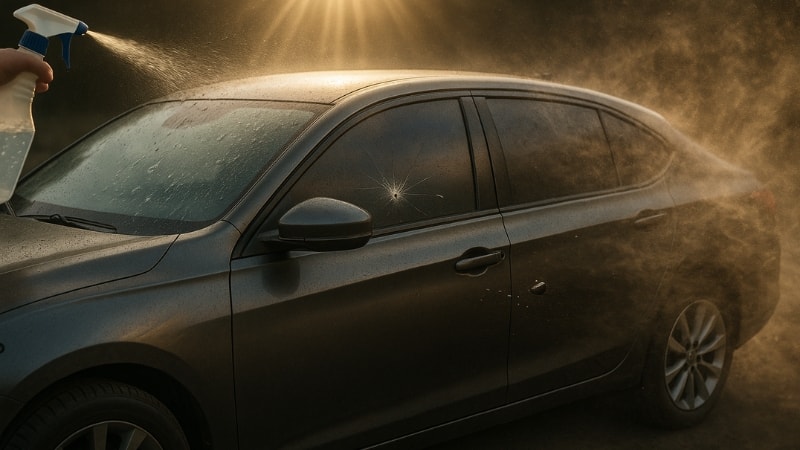
Recommend Upgrade
Different tint films have different capacities to withstand the rugged conditions; thus, you can help them decide according to their expectations.
If they want a window tint that lasts them a decade long, they will also need to bear a certain cost of tinting and investment either in ceramic tint or in carbon tint film.
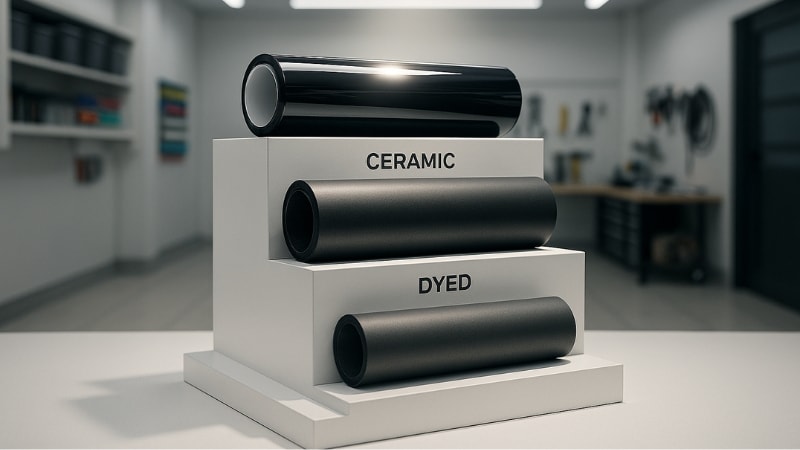
Inform Better Choices
The owners of high-end cars and others may want their wheel buddy to stay in its prime glory forever. Enlighten them about the benefits of premium tinting options as well as a reputable paint protection films brand, to prevent scratches on the tinted window and the exterior of their vehicle.
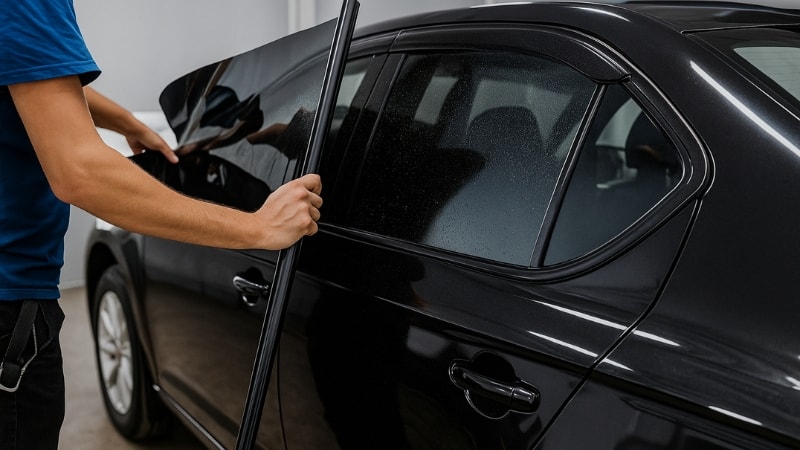
Lifespan of Window Tint Film
Apart from the environmental factors that strongly influence the lifespan of window films, every film type comes with its own expected lifetime. During this period, the tint usually stays in good condition, provided that proper maintenance is carried out.
However, it is wise to replace the tint entirely once this lifespan reaches its end, since the adhesive has gradually shrunk over time, compromising both performance and appearance.
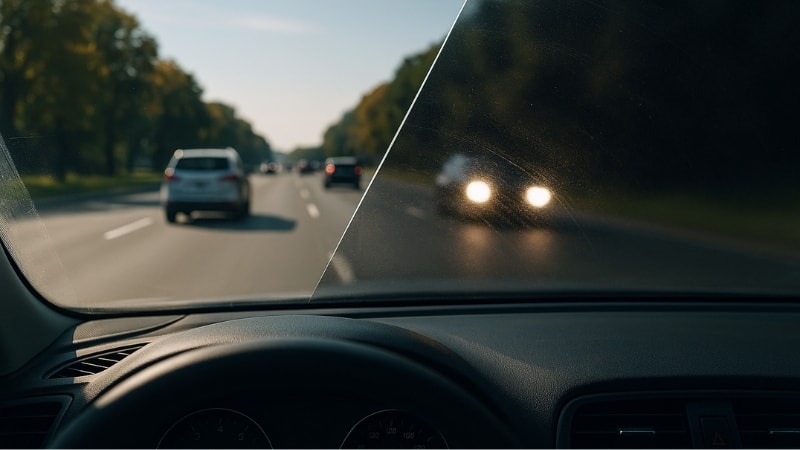
Here’s a bird’s-eye overview of the average lifespan of tinted window films:
| Window Tint Type | Expected Lifespan | Lifespan Without Care |
|---|---|---|
| Dyed Tint Film | 3 to 5 Years | 2 Years |
| Metalized Tint Film | 5 to 7 Years | 3 to 4 Years |
| Ceramic Tint Film | 10 & More Years | 7 to 8 Years |
FAQs
Q1: Is it worth upgrading to high-quality car window films?
Definitely. The key to highlight here is that upgrading to a quality tint is like an investment in which you will also get the ROIs. While high-quality tints may cost more initially, they deliver a long-term solution that comes with safety.
Q2: Can replacing old tint improve driving safety?
Yes, clear and fresh film reduces glare, restores visibility, and ensures safer driving.
Q3. Does new window tint add value to my car?
Definitely. A fresh tint improves appearance, comfort, and helps maintain resale value.
Q4. How to differentiate between normal aging and premature fading?
Normal aging just means the film slowly and evenly lightens over the years, while still looking clear.
Premature fading is different; it happens when cheap dyes, poor installation, or strong cleaners are involved, and it shows up as ugly, uneven patches.
Conclusion
Window tint film enhances comfort, UV protection, and privacy, but fading over time can reduce its benefits. Sunlight, poor materials, or neglect speed up discoloration. With proper care and timely replacement, you’ll maintain lasting protection, style, and performance for your vehicle.
Buy Fade-Resistant Tint Films at Wholesale Prices – Contact CarLike® Now!
Carlike Film, China’s leading tint film brand, offers premium-quality automotive films trusted by studios and car owners worldwide. With a full range of tint, PPF, and wrap solutions, we guarantee durability, style, and performance. So, you can benefit from competitive pricing, fast delivery, and expert support.
Contact Carlike today for a quote and catalogue! Grow your business with confidence!



